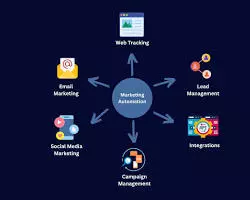Marketing Automation Mastery: Unleashing CRM's Power to Drive Growth in 2024

Marketing Automation with CRM Software
In the digital age, marketing automation has become an indispensable tool for businesses seeking to engage customers, nurture leads, and drive growth. When integrated with Customer Relationship Management (CRM) systems, marketing automation becomes a powerful force, streamlining campaigns, personalizing communication, and delivering measurable results.
The Essence of Marketing Automation
Marketing automation encompasses the use of software and technology to automate repetitive marketing tasks, such as email campaigns, social media posts, and lead nurturing workflows. By automating these processes, businesses can:
- Save Time and Resources: Free up valuable time and resources for more strategic activities, such as content creation and campaign planning.
- Improve Efficiency: Streamline marketing workflows, reducing manual errors and ensuring consistent messaging across channels.
- Enhance Personalization: Deliver targeted and personalized messages to customers based on their interests, behavior, and demographics.
- Increase Engagement: Nurture leads with relevant content and personalized communication, increasing their likelihood of converting into customers.
- Track and Measure Results: Monitor campaign performance with detailed analytics and reporting, allowing for data-driven optimization and improvement.
How CRM Supercharges Marketing Automation
CRM systems play a pivotal role in marketing automation by providing a centralized platform for managing customer data, segmenting audiences, and tracking campaign performance. Key benefits of integrating CRM with marketing automation include:
- 360-Degree Customer View: Access a complete picture of each customer, including demographics, interests, purchase history, and engagement with marketing campaigns.
- Lead Nurturing: Automate lead nurturing campaigns with personalized email sequences, targeted content, and timely follow-ups, guiding leads through the sales funnel.
- Segmentation and Targeting: Create highly targeted segments based on customer data and tailor marketing messages to resonate with specific audiences.
- Campaign Management: Plan, execute, and track the performance of marketing campaigns across multiple channels, including email, social media, and websites.
- Analytics and Reporting: Gain valuable insights into campaign performance, including open rates, click-through rates, conversions, and ROI, to optimize future campaigns.
Mastering Marketing Automation with CRM
To leverage the full potential of marketing automation with CRM, consider these best practices:
- Define Your Goals: Clearly outline your marketing objectives and what you want to achieve with automation.
- Choose the Right CRM: Select a CRM platform that offers robust marketing automation capabilities and integrates seamlessly with your existing tools.
- Segment Your Audience: Divide your target audience into smaller, more specific segments based on demographics, interests, and behaviors.
- Create Compelling Content: Develop high-quality content that resonates with your target audience and addresses their pain points.
- Personalize Your Messages: Tailor your marketing messages to each segment, using personalized greetings, relevant offers, and dynamic content.
- Test and Optimize: Continuously test and refine your marketing campaigns based on data and insights, optimizing for maximum engagement and conversions.
Conclusion
Marketing automation, when integrated with CRM, becomes a game-changer for businesses in 2024. By automating repetitive tasks, personalizing communication, and leveraging data-driven insights, businesses can achieve greater efficiency, engagement, and growth. Embrace the power of CRM-powered marketing automation to unleash your marketing potential and propel your business to new heights.

Fundamentals of CRM with Dynamics 365 and Power Platform

Marketing Automation For Dummies

Successful Direct Marketing Methods: Interactive, Database, and Customer-based Marketing for Digital Age (BUSINESS BOOKS)

CRM & FFHH: analysis of real accidents

Connected CRM: Implementing a Data–Driven, Customer–Centric Business Strategy

Special Edition Using Microsoft CRM
Related Guides: See all
- AI-Powered CRM: Supercharging Customer Relationships with Intelligent Automation and Predictive Insights in 2024
- Omnichannel Engagement with CRM: Crafting Seamless Customer Journeys in 2024
- Personalization Powerhouse: How CRM Drives Customer-Centric Experiences in 2024
- Customer Segmentation Mastery with CRM: Unlock Personalized Marketing and Sales Strategies in 2024
- Mastering the Customer Journey with CRM: Elevate Experiences and Boost Loyalty in 2024
- Social CRM: Building Stronger Customer Relationships Through Social Media in 2024
- Cloud CRM: Revolutionizing Business Agility and Scalability in 2024
- Mobile CRM: Empowering Sales and Service Teams on the Go in 2024
- CRM Integration and API: Unifying Your Business Ecosystem for Seamless Operations in 2024
- Data-Driven Decisions with CRM: Harness the Power of Reporting and Dashboards in 2024